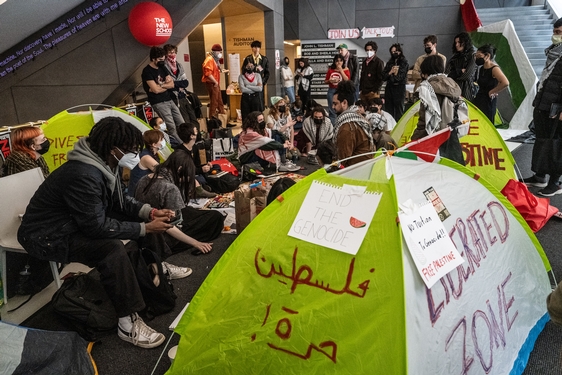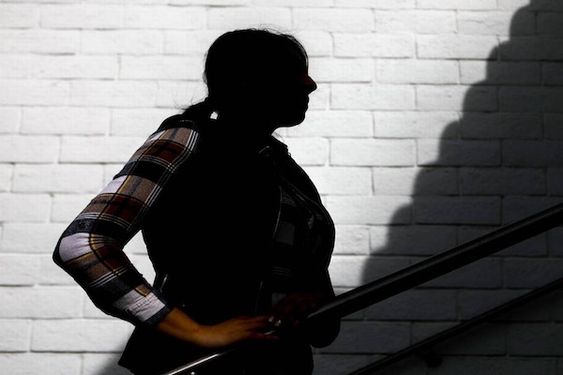Graduation day was fast approaching at the Chicago Academy for the Arts, a small private high school on the city’s Near North Side where students are invited to imagine a better world and then use their art to create it into existence.
Jason Patera, the head of school, had his talking points ready for the Annual Dispensing of Unsolicited Advice (more about that in a moment). The teachers had written their toasts to the 30 graduating seniors — individual speeches that pay tribute to each student’s accomplishments and personality.
Everything would be presented at the annual senior lunch, which would take place (for the first time ever) virtually.
One question remained: How to get the students their actual diplomas.
Students who attend Chicago Academy for the Arts come from all over the city, but also from Michigan and Indiana and Wisconsin and Chicago’s suburbs. A few years ago I wrote about Zachary Jeppsen, a ballet dancer who commuted to the school each day from a small farm outside Whitewater, Wisconsin.
This year’s graduating seniors hailed from, among other places, Flossmoor and Maywood and Warrenville and Dyer, Indiana.
“The week of graduation I got it into my head that if I just did six or seven a day, I bet I could drive to every kid’s house and hand them their diplomas,” Patera told me.
He was deciding when to approach his team of teachers and advisers when an email popped into his inbox from Chris Arnold, the school’s assistant principal. A group of teachers was planning a caravan of cars to drive by the seniors’ homes and wave to them and cheer for them and see their faces in the flesh one more time before they turned from academy students to academy alums.
“So here we have two different contingencies planning to drive to every senior’s house to congratulate and recognize and celebrate them,” Patera said.
They decided to pool their efforts. They met in the wee hours of May 20 at a car wash in West Dundee: Patera, plus a group of teachers and administrators, and school security guard Van Jackson. (“Van Jackson is one of the most universally beloved and respected people in our community,” Patera said. “The kids care 1,000 times more if Van Jackson shows up at their house than if I do.”)
The group spent the next two days delivering diplomas. They drove 400 miles in all.
“They were all emotional,” Patera, 44, said. “Every one of them.”
The caravan would pull up. Patera and Jackson and the teachers would pop out. The students’ faces would go from perplexed to delighted. Parents and grandparents, often, would be staked out on the sides, ready to capture the whole scene with a phone.
“You’d get a lot of, ‘No way. No way,’” Patera said. “And then the student is crying and the parents are crying and I’m crying and everyone’s crying.”
Patera arranged the stops with the students’ families ahead of time, so someone in the home knew they were coming. Once they arrived, Patera delivered a little speech (wearing a mask, standing at a safe distance) to each student, presented a diploma and then requested that the student keep the visit under wraps.
“As far as we can tell, every student was surprised,” Patera said. “We made a big production about them letting their peers experience the same surprise, and the surprise did seem genuine at every stop.”
Four hundred miles is a lot of road to cover in a couple of days. Patera said he and his staff had no regrets.
“Not only was it absolutely the highlight of the year for me,” he said, “after doing this for 22 years, it was absolutely a career highlight. I’ll never forget.”
By the time the actual graduation ceremony rolled around — the virtual one, with the teacher speeches and Patera’s Unsolicited Advice — the diplomas were in hand.
I wrote about Patera’s Annual Dispensing of Unsolicited Advice last year. It’s this really lovely blend of hard-won wisdom and gentle nudges:
“Art is really important. Whether or not you actually end up making it, you have a responsibility to support it, with both your time and your money.”
“Community is also really important, and it’s almost certain that you will never find a community like this one again. That’s OK — you shouldn’t just be looking for communities anymore, you should be building them.”
“Being someone is always better than seeming like someone. Be a great artist. Be a good person. Be happy. Don’t just waste time trying to seem like it on Instagram.”
“There’s an old joke that you should take to heart: ‘How did the artist end up with a million dollars? They started with $2 million.’ Become an expert with money. Start today. It is not hard to be the smartest person in the room about money, and Google will teach you — for free — how to do it. Keep in mind, though, that money and happiness are pretty much unrelated. If you’re miserable when you’re broke, you’re still going to be miserable when you’re not.”
“Be sober. The more you believe that alcohol and drugs help you do anything, the more it means you have work to do when you’re sober. Sooner or later, we all have to operate in reality, and living cleanly will illuminate paths for you that will take you anywhere worth going.”
Patera said the list often comes up years later, when his students come back to visit.
“In the moment, they all receive it like anyone would receive advice from a guy in a suit at their high school,” he said. “But inevitably a student will come back five years later and say, ‘I never forgot that you told me to be smart about money,’ and they’ll pull out a statement from their pocket. ‘I wanted you to see I started an IRA.’”
I love that image for two reasons: One, it makes me happy to think about young people being sent out into this world, which can be awfully cruel, armed with good advice delivered lovingly. Two, it’s a reminder that some of the seeds we’re planting now — with our kids, in our communities — might take a little while to grow.
But they’re always, always worth the effort.
———
©2020 Chicago Tribune
Visit Chicago Tribune at www.chicagotribune.com
Distributed by Tribune Content Agency, LLC.



